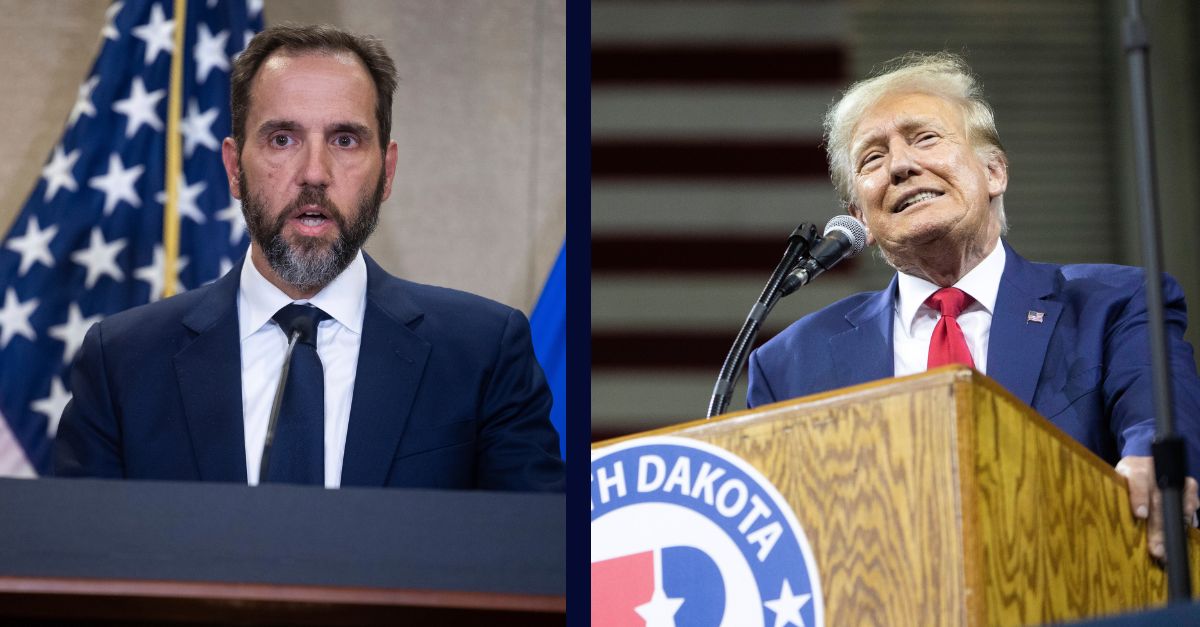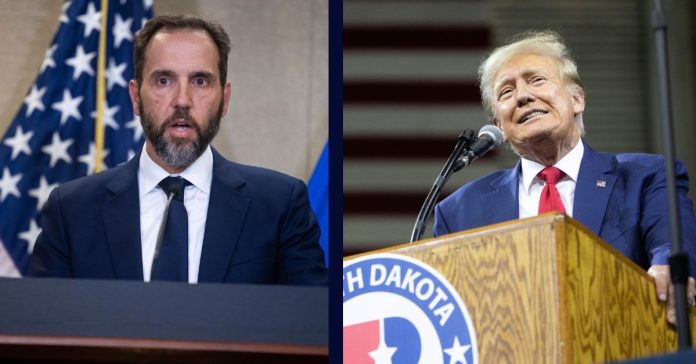
Left: Special counsel Jack Smith speaks to the media about an indictment of former President Donald Trump, Tuesday, Aug. 1, 2023. (AP Photo/J. Scott Applewhite, File). Right: Former President Donald Trump speaks at the South Dakota Republican Party Monumental Leaders rally Friday, Sept. 8, 2023, in Rapid City, S.D. (AP Photo/Toby Brusseau)
The federal judge overseeing the election subversion trial of former President Donald Trump in Washington, D.C., says that special prosecutor Jack Smith didn’t violate a stay order as part of the case is heard on appeal, and he will not be held in contempt, although he will need to get permission to file any “substantive” motions.
As Law&Crime previously reported, lawyers for the former president filed a motion on Jan. 4 demanding that U.S. District Judge Tanya Chutkan hold Smith in contempt of court for producing discovery and filing a pretrial motion. The criminal case, in which Trump is accused of conspiring to block the Jan. 6 certification of Joe Biden’s 2020 electoral win, was stayed as Trump appealed Chutkan’s rejection of the ex-president’s “absolute immunity” defense.
Smith’s filing and discovery production, attorneys John Lauro and Todd Blanche alleged, amounted to “outrageous conduct” that warranted a finding of contempt, as well as sanctions.
For the most part, Chutkan declined the lawyers’ request. She said that Smith’s actions — providing discovery and filing a pretrial motion — were not clearly prohibited by the stay order.
“[S]taying the deadline for a filing is not the same thing as affirmatively prohibiting it,” she explained. “The basic function of a deadline is not to authorize a filing, but to time-limit it; correspondingly, the lifting of a deadline removes that time limit but does not necessarily bar the filing. On its own terms, then, the Stay Order’s key operative sentence did not clearly bar the Government from voluntary rather than obligatory compliance with the Pretrial Order’s now-stayed deadlines.”
Chutkan found that providing Trump with discovery wasn’t outside the boundaries of the stay order and that Smith’s productions and filings “have been mostly compatible” with the purpose of the stay order, which was to “relieve Defendant from the burdens of preparing for trial and other pretrial litigation.”
“The court cannot conclude that merely receiving discovery or an exhibit list constitutes a meaningful burden,” Chutkan continued. “That receipt requires no review or response.”
Chutkan did agree with the defense lawyers’ argument that Smith’s motion still required the lawyers to review it “to determine whether it is ‘not involved in the appeal”” and to decide whether and how to respond.
“[D]iligent defense counsel will need to conduct a preliminary review of each substantive motion the Government files in order to know whether they need to take further action,” the judge wrote. “While that is not a major burden, it is a cognizable one. Accordingly, the court will adopt Defendant’s recommendation that the parties be forbidden from filing any further substantive pretrial motions without first seeking leave from the court.”
Chutkan instructed the parties that if they opposed the request, they would have to file a response as well.
“Any such motion for leave to file shall state whether the proposed motion is ancillary to the pending appeal and so requires a timely response or other action before the mandate is returned,” the order said.
The judge noted that her ruling “does not reflect a determination that the Government has violated any of its clear and unambiguous terms or acted in bad faith.”
Read the ruling here.
Have a tip we should know? [email protected]

